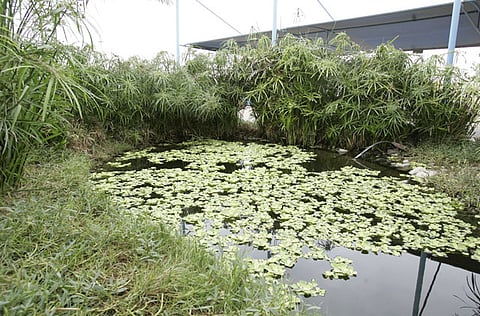Green way to treating effluent water
Ras Al Khor site treats sewage and saves on water and energy by filtering waste through reeds

Dubai: Growing tall and green, nestled inside the Ras Al Khor Industrial area, reeds, usually associated with marshlands, are thriving as part of a sewage solution at a worker's accommodation.
The area also serves as a show-and-tell site for what can be achieved to treat sewage close to habitations without any smell, and saving gallons of water at the same time.
The water effluent captured after being filtered through the reed bed is being used to grow fruits and vegetables, flush toilets once more and now, clean solar panels.
The water is so clean in fact that some of it is used in landscaped ponds outside the Waagner Biro Gulf offices, where Nile Cabbage floats atop cleaning the water and providing nutrients for tilapia fish below.
Workers pastime
Overhead power pylons, heavy machinery and mechanical workshops surround the site while inside butterflies and birds make the most of the reed forest and the vegetable plot tended to by workers as a pastime.
The reed beds only occupy 600 square metres and are a low-energy and low-cost solution to treating human waste for around 150 people living and working at the Waagner Biro Gulf site. Up to 35,000 litres of sewage is generated at the accommodation daily, diluted with waste water in holding tanks and flushed over the surface of the reeds and absorbed.
Below ground at 1.5 metre depth, a plastic membrane allows for water to drip through and is collected ready to water the garden or cool the solar panel canopy above.
Ironically, photo voltaic solar panels do not work to their full potential in the UAE due to high summer temperatures and dust, said Peter Neuschaefer, Director Middle East for the Water, Energy and Environment Technologies of Waagner Biro Gulf who designed the TerraSave Concept.
For every degree above 25 degree Celsius, the panel's efficiency decreases by 0.5 per cent, said Neuschaefer. In summer, panels can reach a heat of up to 80 degree Celsius but PV panels are only up to 30 per cent efficient.
"If the panels are cooled and clean, the efficiency is much better," said Neuschaefer. However, in a water scarce country such as the UAE a solution had to be found. By combining sewage treatment via reeds and cooled solar panels from the waste water in an integrated system, the technique is able to manage biodiversity, solves a water issue and reduces energy consumption.
Waagner Biro Gulf was recently awarded a MEED Quality Awards for Projects in the sustainability category for the environmentally-friendly worker's accomodation.
The relatively basic technology used in an integrated manner has already been deployed at a residential villa in Ajman and is being put together for a 60-person labour accommodation in Mirfa, Abu Dhabi, measuring 300 square metres. It takes just one month to get the reed bed in place, said Peter Bridgewater, director of Global Garden Consulting and former Ramsar Convention secretary general, whose aim is to protect wetlands.
"The older the reed bed is the more complex it becomes and better able to treat whatever sewage you throw at it," he said. "The reeds form the structure for the entire ecosystem and it is the tiny animals and organisms in the soil that do all the work," he said.



